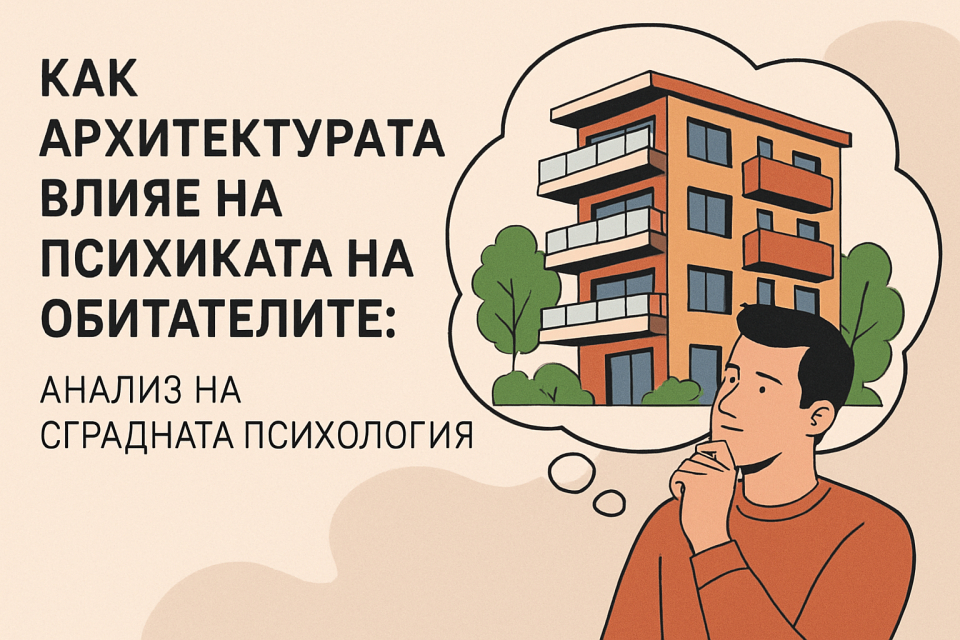Owning your own home has long been considered a universal goal – a symbol of personal progress, security and a settled life. For generations before us, it was an almost natural transition: completing your education, finding a job, buying an apartment, starting a family. Today, this sequence seems increasingly unattainable for young people. The new reality places them in a situation where housing is no longer the “next logical step” but rather a distant dream, often replaced by long-term rental or even living in a shared apartment.
This change is not accidental. It is the result of a number of economic, demographic and market processes that are developing in parallel at the global and local level. In Bulgaria, as in many other countries, there is a sharp increase in real estate prices - especially in large cities. In Sofia, for example, the average price per square meter in new construction already exceeds 2,000 euros, while average salaries for young people remain relatively unchanged and are often insufficient to cover a mortgage payment and accompanying expenses. This leads to a paradoxical situation: even with a good job and a stable income, a young person can hardly afford to buy their own home.
Inflation is also putting additional pressure. Rising prices for goods and services, combined with rising interest rates on loans, are making financing even more difficult. Where a mortgage seemed like a realistic option a few years ago, today it is becoming a risky and often unattainable commitment. Financial institutions are becoming increasingly cautious, and self-financing – the initial payment of 15-20% – requires savings that few young people have.
All this leads to the emergence of the phenomenon of "Generation Rent" - a term that describes the generation of young people forced to live in rent not by choice, but by necessity. This is not a temporary condition, but a long-term life model, in which renting becomes a long-term reality. And although in countries such as Germany, the Netherlands and Austria the rental market is developed and regulated, in Bulgaria the situation is different - rents are not subject to strict control, conditions are often uncertain, and tenant protection is minimal.
The psychological impact of this inaccessibility is serious. For many, the younger generation is starting to lose the sense of “home,” of a place that is theirs, safe, and stable. This also reflects on the decision to start a family, raise children, or even simply establish a long-term life in a given city. Housing insecurity creates a sense of temporality that deters a number of important life choices.
The trend also leads to internal migration. More and more young people are leaving Sofia or other large cities and heading to smaller settlements, where property prices are still affordable. Others choose the path of emigration in order to accumulate capital for a future purchase in Bulgaria. In both cases, there is an outflow of active young labor from large urban centers, which creates new problems for the development of cities.
Meanwhile, other countries are seeking and implementing a variety of solutions. In Germany, rent caps and social housing programs are being introduced. In Sweden, quotas are being implemented for affordable apartments in new construction. In the UK, the government is supporting young buyers through programs such as “Help to Buy” or “shared ownership,” where people buy part of the home and pay rent for the rest. In Austria and Switzerland, there are well-structured housing cooperatives – models that combine affordability, ownership, and community.
In Bulgaria, such initiatives are almost non-existent. There are partial reliefs on loans for young families, but they are limited, often administratively complex and do not cover a sufficiently wide group. The lack of a comprehensive state policy on housing affordability places the decision entirely in the hands of the private sector and the citizens themselves. As a result, young people are looking for alternatives: joint purchase with relatives, investment in properties in the countryside, acquisition of property through inheritance, living with parents until old age.
But no matter how creative individual strategies are, they cannot replace a systemic framework that guarantees every young person a fair chance to achieve ownership – if not immediately, then at least in the foreseeable future. Market logic, left without social balance, leads to stratification, in which some generations accumulate assets while others live in insecurity.
The issue is not only economic. It is also cultural. In Bulgaria, home is still deeply valued and tied to a sense of belonging and fulfillment. Therefore, the lack of access to housing is not just a lack of “roof”, but a feeling of exclusion from the social contract. Until workable solutions are found – both through the market and the state – “Generation Rent” will continue to be not only a term, but also a reality that marks an entire generation with uncertainty, postponed plans and compromises with dreams.

Register for free to be the first to hear the news on imi.bg
Registration


